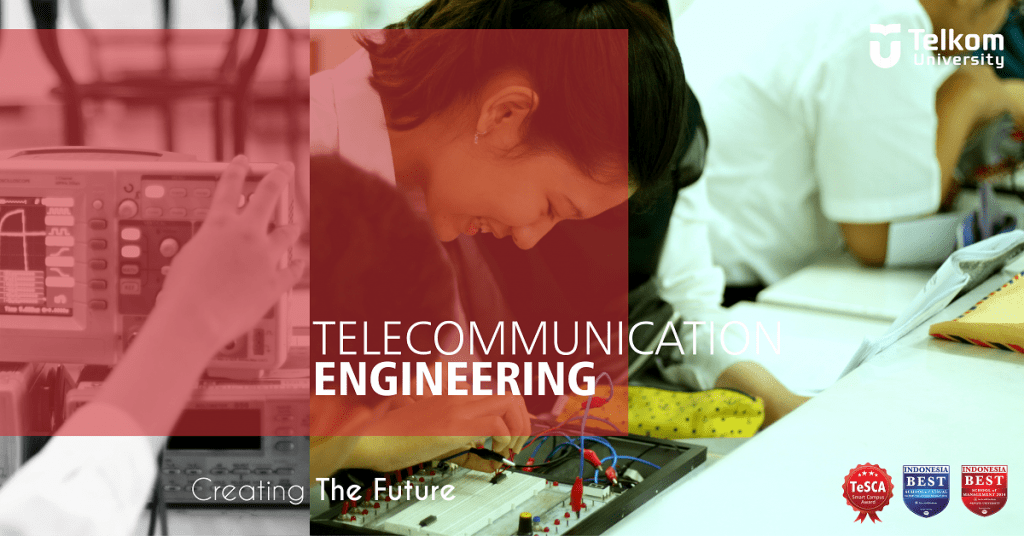| Course Code | 20202 |
| Course Name | Telecommunication Engineering |
| Department Head | Arfianto Fahmi |
| Department Secretary | |
| Address | Jl. Telekomunikasi No.1 Trs. Buahbatu – Dayeuhkolot |
| Post Code | 40257 |
| City | Kab. Bandung |
| Telephone Number | +62-22-7565933 |
| Facsimile Number | +62-22-7562721 |
| Email Address | prodis1tt@ittelkom.ac.id |
| Website | stt.fek.ittelkom.ac.id |
| Title given | Bachelor of Engineering (S.T.) |
| Brief Description | Telecommunication Engineering Bachelor program began in 28 September 1990 in Bandung, West Java , in conjunction with the establishment of Sekolah Tinggi Teknologi Tellkom (STT Telkom ). In its dynamic improvement and institutional development, the study program has undergone changes as follow:In 2007, STT Telkom transformed into Telkom Institute of Technology ( IT Telkom ). Along with this, the Department of Electrical Engineering transformed into the Faculty of Electrical and Communication Engineering.
In 2013, IT Telkom merged with IM Telkom, STISI Telkom and Telkom Polytechnic into Telkom University (Tel-U). Bachelor study program of Telecommunication Engineering is the Faculty of Electrical Engineering. The campus is built on an area of 48 hectares which is a grant from the PT. Telkom. Each classroom is equipped with an LCD projector, OHP, RFID attendance and CCTV. For practical purposes, the faculty prepares lab module equipped with supporting instruments, 22 laboratory 22; and 2 mechatronics and electronics workshops, administrative services rooms, a library, student activities units, and dormitory for male and female. Internet is accessible in all areas of the campus. In addition, there are several facilities and infrastructure supporting campus activities that include mosques, recreation areas, sports facilities and areas, cafeteria, parking lots, ATM centers, gazeebo, banks, and business center . In addition to the BAN – PT (National Accreditation Board for higher education), other quality standards that are implemented among others:
Implementation of Malcolm Baldrige National Quality Program for Excellent Performance ( MBPE ) since 2002 .
Implementation of the International Standard Organization ( ISO ) 9001:2008
These standards are applied to the entire study programs and support units since December 28, 2010 .The study program received a rating of B in 2013 from Accreditation of Higher Education Institutions ( AIPT ). |
| Vision | Becoming Telecommunication Engineering bachelor program with international standard in 2017, which resulted in Telecommunication Engineering Bachelors who are skillful in the field of broadband telecommunications and able to put into practice the science, to develop themselves, good personality in their life as community members. |
| Mission | - Implementing superior educational process to produce graduates who master telecommunication technology in accordance with the technical competence, specifically in broadband.
- Implementing international quality research in the field of information and communication by involving students actively.
- Implementing community service with the the principles of utilization of science and technology as research results to the community that prioritizes teamwork synergistically with other institutions.
|
| Course Competence | - Applying basic knowledge of mathematics, science and engineering , skills, and equipment ( tools) in analyzing and solving telecommunication engineering problems;
- Identifying formulation and problem resolution by adhering to professional rules ;
- Designing, conducting research with experimental stages, conducting analysis and interpretation of data, and draw conclusions based on the scientific methods;
- Mastering the skills in doing programming and the use of (at least one) and programming software (one) application software ;
- Conducting communication and interaction in a positive way , both individually and in a multidisciplinary team;
- Understand professional and ethical responsibility ;
- Understanding enterpreneurships attitude and skills both individually and in a multidisciplinary team;
- Increasing insight of general knowledge needed to understand the effects of engineering solutions in a social or global context;
- Understanding the importance of lifelong learning , and open to existing development ;
- Increasing insight of contemporary technological developments in the field of Telecommunication Engineering expertise;
- Using English in formal meetings;
- Obtain international certificates.
|
| Learning Outcomes | Students:- Able to analyze and solve the telecommunication problems
- Able to do programming and use software programs and applications
- Have the knowledge and expertise in the field of telecommunication hardware
- Have insights into technological developments in the field of Telecommunication Engineering expertise.
- Able to communicate individually or in a team of multidisciplinary
- Have understanding of professional and ethical responsibility
- Have the awareness of long life learning
- Have the ability to communicate in Indonesian and English both orally and in writing
|

